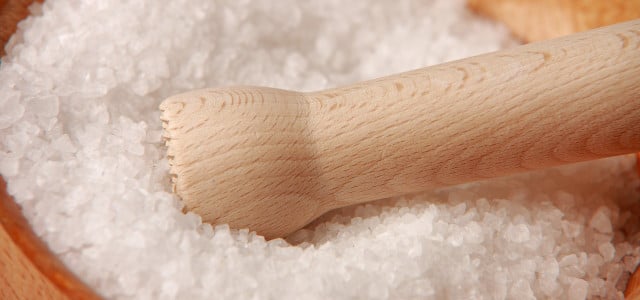
Glauber’s salt is mainly used as an aid to fasting. We will show you how to dose Glauber’s salt correctly and what other effects it has.
Glauber’s salt is created when table salt (sodium chloride) and sulphuric acid combine. The resulting sodium sulphate tastes extremely bitter, which is why Glauber’s salt is often equated with Epsom salt. The difference? Although both have a similar or identical effect, Epsom salt is magnesium sulphate.
How Glauber’s salt works and its uses
Because of its laxative effect, Glauber’s salt is used to empty the bowels, especially before fasting. The so-called “Glauber’s salt” is supposed to remove all food residues from the intestines. It is also supposed to reduce the feeling of hunger.
In addition to emptying the bowels before fasting, Glauber’s salt is also suitable for cleansing the bowels before a colonoscopy. Glauber’s salt can also be used for a short period of time in cases of severe constipation. You can often find dissolved Glauber’s salt in spas, for example in saltwater pools.
Glauber’s salt is a so-called osmotic laxative. This means that as soon as it enters the intestine, it draws water from the surrounding tissues there, softening the stool and increasing the volume of the stool. This stretches the intestinal wall, which stimulates the unconscious muscle movement of the intestine, which moves the intestinal contents forward. This means that the intestine empties particularly quickly.
Historical background of Glauber’s salt
Glauber’s salt was first discovered in the 17th century by the Dutch pharmacist Johann Rudolf Glauber, who produced the salt by reacting table salt with sulphuric acid. Glauber called the resulting product “mirabilis sal”, which means “miraculous salt”, because it became known for its laxative effect. Sodium sulphate also occurs naturally, for example in mineral waters or as deposits in former salt lakes.
Side effects of Glauber’s salt

(Photo: CC0 / Pixabay / pheee)
You should not take Epsom salts if you:
- a sensitive gastrointestinal tract or
- have a stomach ache,
- pregnant or
- have heart disease or
- have high blood pressure, as Glauber’s salt can increase blood pressure.
Be careful if you are taking birth control pills, as they can lose their effectiveness when you empty your bowels. They can also interact with other medications. Because of their strong effects, you should consult your doctor before using Glauber’s salt.
You also have to make sure you drink enough water. This means you need to drink a lot more water than normal when you are suffering from Glauber’s salt. This is because your body loses a lot of fluid when you empty your bowels. If you don’t compensate, you can quickly get dizzy or have a headache.
How to use Glauber’s salt correctly

(Photo: CC0 / Pixabay / ExplorerBob)
Because Glauber’s salt has a relatively strong effect, the correct dosage is important. On the packaging instructions you will usually find a recommendation of:
- Two to four teaspoons of Glauber’s salt dissolved in 250 milliliters of water.
- For extremely rapid bowel emptying, especially before fasting, dissolve one to two tablespoons of Glauber’s salt in 500 milliliters of water.
- Drink Glauber’s salt solution and rinse with the same amount of pure water.
The salt crystals should be completely dissolved before consumption, which is why warm water is recommended. Glauber’s salt can take effect after just 30 minutes or after several hours. To be on the safe side, you should always have a toilet nearby and not be out shopping in the city.
Tip to combat the bitter taste: Mix in lemon or orange juice. Hold your nose when drinking to impair your taste sensors and not perceive the bitter taste so strongly.
Glauber’s salt under criticism
Often the criticism is not directed against Glauber’s salt directly, but against the context in which the salt is used: for example, fasting, “detoxification” or using Glauber’s salt for laxatives. The side effects of Glauber’s salt already mentioned show that it should not be taken regularly. Especially in the context of eating disorders, there is a high risk of serious damage to the intestines through regular laxatives with Glauber’s salt.
Regular use of Glauber’s salt is therefore not recommended, and the packaging also warns against this. In addition to damaging the intestines, minerals such as potassium can also be lost and, in the long term, heart problems and muscle weakness can occur. The increased sodium content in the body can cause edema, which is why special care is required during pregnancy.
If the side effects mentioned are too risky for you, you can use an enema as an alternative to empty your bowels.
Read more on Techzle\.com:
- Plastic fasting: 40 days without plastic
- Intermittent fasting: What are the real benefits of this hip form of fasting?
- Clean Eating Nutrition Trend: What’s Behind It?
Edited by Denise Schmucker
** marked with ** or orange underlined Links to sources are partly affiliate links: If you buy here, you are actively supporting Techzle\.com, because we then receive a small part of the sales proceeds. .